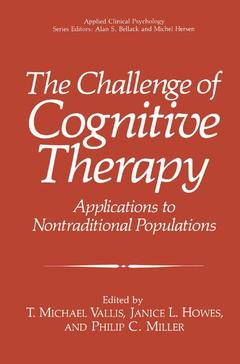Description
The Challenge of Cognitive Therapy, Softcover reprint of the original 1st ed. 1991
Applications to Nontraditional Populations
NATO Science Series B: Series
Coordinators: Vallis T. Michael, Howes Janice L., Miller Philip C.
Language: English
Subject for The Challenge of Cognitive Therapy:
Keywords
Depression; Motivation; Validation; rehabilitation; stress; therapy
Publication date: 06-2013
186 p. · 15.5x23.5 cm · Paperback
186 p. · 15.5x23.5 cm · Paperback
Description
/li>Contents
/li>
Cognitive therapy is fast becoming one of the more popular and well respected forms of psychotherapy. In both research and clinical practice, several advantages of cognitive therapy have been identified. Cognitive therapy is structured enough to provide a therapeutic framework for clinicians, as well as a theoretical framework for clinical researchers, yet flexible enough to address an individual's problems in a highly idio syncratic manner. Accompanying the popularity of cognitive therapy is the expansion of its application beyond the areas in which it was initially developed and validated (the "traditional" areas of depression and anx iety) to areas where validation has not yet occurred (the "nontraditional" areas). We strongly believe that such broadening of cognitive therapy should be encouraged, but that conceptual models to guide the therapist and researcher in these areas should be explicated. It is the purpose of this text to provide a conceptual framework for dealing with select, nontraditional populations. The idea and motivation for this text develops from a cognitive therapy interest group in Toronto. All of the authors contributing to this text are involved in this group. We represent a group of cognitive thera pists functioning in a variety of diverse settings, including clinical re search units, general hospital settings, private or public rehabilitation centers, and private practices. Thus, the diversity of referrals for cogni tive therapy within our group is great.
I: Theoretical Advances in Cognitive Therapy.- 1. Theoretical and Conceptual Bases of Cognitive Therapy.- 2. Conceptualization and Flexibility in Cognitive Therapy.- 3. The Therapeutic Relationship and Resistance to Change in Cognitive Therapy.- II: Clinical Applications.- 4. The Application of Cognitive Therapy to Patients with Personality Disorders.- 5. The Application of Cognitive Therapy to Posttraumatic Stress Disorder.- 6. The Application of Cognitive Therapy to Postpartum Depression.- 7. The Application of Cognitive Therapy to the Bereaved.- 8. The Application of Cognitive Therapy to Chronic Pain.
© 2024 LAVOISIER S.A.S.




